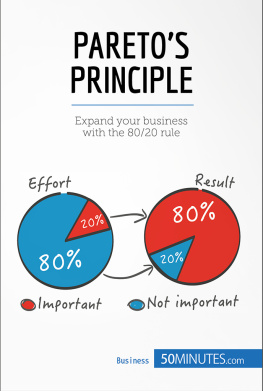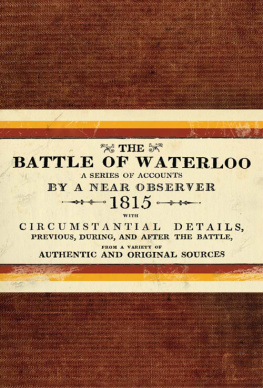THE BATTLE OF WATERLOO
KEY INFORMATION
When: 18th June 1815
Where: Waterloo (Belgium)
Context: The Napoleonic Wars (1803-1815)
Belligerents: The French Empire against the United Kingdom, the Kingdom of Prussia, the United Kingdom of the Netherlands and various small German states.
Commanders and leaders:
Gebhard Leberecht Blcher, Prussian marshal (1742-1819)
Napoleon I, French emperor (1769-1821)
Arthur Wellesley, Duke of Wellington, commander of British, Dutch and German troops (1769-1852)
Outcome: Decisive victory of the coalition
Victims:
French camp: approximately 26,000 killed and wounded
Coalition camp: approximately 24,000 killed and wounded
INTRODUCTION
Napoleon I came to power in France in 1799 and, during his reign, tried to control the entire European continent, prompting the creation of several coalitions of the major European powers of the time (the United Kingdom, Prussia, Russia and Austria) against him.
Defeated for the first time in 1814, Napoleon returned to power a year later and raised a new army. Hoping to triumph over his opponents before they joined forces against him, he invaded Belgium on 15th June in order to defeat the British, the Dutch and the Prussians. A French victory would revive the Empire and plunge Europe into war once again; a defeat would mark the end of the Napoleonic era and the return of the monarchy in France: this challenge was therefore crucial.
The battle took place on 18th June in Mont-Saint-Jean, a few kilometers south of Waterloo. At 11:15am, Napoleon I risked everything and attacked. The Anglo-Dutch army, under the command of Arthur Wellesley, managed to contain the French and, a few hours later, gained the reinforcement of the Prussian troops, commanded by Gebhard Leberecht Blcher. The allies attacked and the French were beaten and forced to flee.
The victory was decisive: Napoleon abdicated a second time on 22nd June 1815 and was exiled to the island of St. Helena (South Atlantic).
POLITICAL AND SOCIAL CONTEXT
Far from being an isolated event, the Battle of Waterloo was the end point of a struggle between revolutionary, and then imperial, France and the other European powers who felt threatened by the expansionist ambitions of Napoleon I. To understand the origins of this conflict, we must look back at the French Revolution (1789).
THE WARS OF THE FRENCH REVOLUTION, A PRELUDE TO THE NAPOLEONIC WARS
Although in 1789 the French people revolted to express their dissatisfaction with the imbalances of society, the Revolution quickly radicalized and pushed European rulers, who feared that it would spread to their own territories, to react. There were several threats to the movement, but they only served to strengthen it: after heavy battle, the Republic was proclaimed on 21st September 1792 and King Louis XVI (1754-1793) was imprisoned, tried and executed on 21st January 1793.
Instead of coming to an end, the conflict strengthened and became ideological: the aim of the new regime in place was to extend the revolution to other European nations to bring them freedom, while the sovereigns wanted to conquer the Republic in order to prevent revolutionary ideas from threatening their kingdoms. Therefore, the different states came together to create coalitions that France had to measure up to:
The first coalition, formed in 1793, included Great Britain, Austria, Prussia, the United Provinces (the Netherlands), Spain and Russia. The fighting lasted until 1797 and resulted in a victory for France, which even managed to conquer the Austrian Low Countries (Belgium) and the left bank of the Rhine. The Republic also entered into an alliance with Spain and extended its influence to Northern Italy;
The second coalition, formed in 1798, brought together mainly Britain, Russia and Austria. While the coalition initially seemed able to win, they split again and France emerged from the conflict victorious. In 1801 and 1802, a series of treaties were signed between the allies and France that formalized the annexation of Belgium and the left bank of the Rhine and increased its influence in Italy.
D ID YOU KNOW ?
During that time, the map of Europe was not like the one we know today:
Germany was not unified and was thus divided into many small states dominated by Austria in the south and Prussia in the east. Unification did not happen until 1871;
Italy was also fragmented. The country was not united until 1870;
Belgium belonged to Austria until the French conquest in 1794. After the defeat of Napoleon I, it was attached to the United Provinces to form the United Kingdom of the Netherlands. But the union did not last and the Belgians acquired their independence in 1830. This is why we refer to Dutch soldiers to designate the Dutch and the Belgians.
THE FRENCH EMPIRE, FROM VICTORIES TO NUMEROUS SETBACKS
During the coup of 18 Brumaire (a name from the revolutionary calendar, corresponding to 9th November 1799), Napoleon Bonaparte took power in France. This episode marked the end of the Republic and the beginning of the Consulate, an authoritarian regime headed by the First Consul, who took the name of Napoleon I. He further strengthened his power when he proclaimed himself emperor on 18th May 1804. Although the ideological aspect of the conflict between France and the other European powers gradually lost its importance, the war continued because of Napoleons expansionist ambitions:
The War of the Third Coalition (1805) between France and the United Kingdom, Russia and Austria. While the English won an important battle at Trafalgar (21st October), the Russians and the Austrians were severely beaten on the continent, especially in Austerlitz (2nd December). This defeat proved fatal to the Austrians who withdrew from the war. The alliance was dissolved;
G OOD TO KNOW
On 2nd December 1805, in Austerlitz (now Slavkov u Brna, Czech Republich), Napoleon I, at the head of 75,000 men, faced 90,000 Austro-Russians. Faced with superior forces, the Emperor achieved one of his most impressive victories: there were only 5,500 of the French dead or injured, compared to the 16,000 enemies incapacitated, 10,000 prisoners and 185 artillery pieces captured.
A few weeks earlier, on 21st October 1805, off Cape Trafalgar (Spain), the Franco-Spanish fleet of 33 ships commanded by Vice Admiral Pierre-Charles Silvestre de Villeneuve (1763-1806), met that of the British, composed of 27 ships and commanded by Vice Admiral Horatio Nelson (1758-1805). Despite Nelsons death, the clash ended in a decisive victory for Great Britain.
The Battle of Austerlitz and the Battle of Trafalgar can be seen as the assertion of the dominance of France and Britain on their preferred terrain: the first preferring the land, the second preferring the sea.














